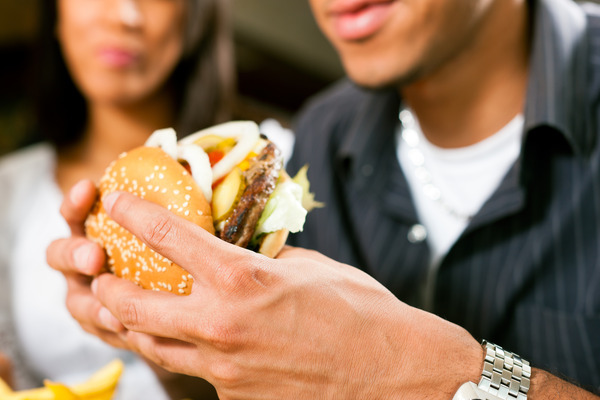Do you feel like you can’t control what you eat? This article is for you! Discover treatments for binge eating disorder.

He Binge eating disorder It is an eating disorder like bulimia and anorexia. It is known that binge eating is frequent both in adolescence and in university students and it is a very common problem in people who usually seek weight loss treatment Losing control over eating at specific times could be a factor prior to the development of this disorder, which is characterized by at least one binge a week for at least three months.
Although one may think that binge eating disorder is easy to manage, the reality is that it has been found that behind it there may be genetic factors that influence its development. Furthermore, it has been found that remission without treatment is significantly lower than in the case of bulimia or anorexia, which is why, like all psychological disorders, treatment is essential.
If you have been giving yourself time food binges and feeling guilty about it, keep reading to discover what binge eating disorder is, what aspects are related to it and what its solution is.
What is Binge Eating Disorder?
Binge eating disorder (also called compulsive eating disorder either CT ), as we have already mentioned, is characterized by Eat excessively for a certain period of time (such as for an hour) and in this time interval there is a loss of control over what is ingested. In order to be diagnosed with binge eating disorder, the following conditions must be met: food binges on a recurring basis and at least three of the following aspects must also be present during binge eating:
- The person eats much faster than usual.
- She eats until she feels unpleasantly full.
- You overeat even if you don’t physically feel hungry.
- He eats only because he is ashamed of the amount he has previously eaten.
- After the binge you feel bad, ashamed and depressed.

Bulimia and binge eating disorder: Differences
When we talk about Binge, we can be confused with another specific eating disorder, bulimia. Although both have periods of binge eating, bulimia It is characterized by compensating for these binges with inappropriate behaviors such as the use of laxatives, vomiting, etc. and is accompanied by an alteration in body image, which differentiates it from compulsive eating disorder.
Risk factor’s:
In different studies it has been found that there are a series of aspects that would increase the probability of suffering from binge eating disorder. The most frequent are:
- Food restrictions: Habitually restricting certain foods may be a risk factor for developing binge eating disorder. This is because during the diet the person makes a considerable effort to avoid certain foods but when they feel emotional discomfort such as, for example, anxiety can lead to breaking the diet and overeating all those foods that had previously been prohibited.
- Low emotional regulation: Poor emotion regulation seems to be a crucial factor in the development of this disorder. Difficulty managing certain emotions could lead the person to try to regulate them through food.
- Emotional intake: Related to the previous factor, certain studies affirm that people without this disorder regulate what they eat through proprioceptive stimuli, that is, internal signals that indicate hunger and satiety. On the other hand, people with BED would regulate intake through emotional states, confusing them with hunger. For example, a person who feels anxious might confuse the anxiety with hunger.
- Perfectionism: Although one might think otherwise, it has been found that people with binge eating disorder They tend to be very perfectionist people who place great importance on following strict personal rules, such as not eating certain foods.
- Stereotypes related to weight: In today’s society, obesity and overweight are often reasons for discrimination. People with obesity are often mistakenly associated with being lazy, unintelligent, and overly emotional. Sometimes, people who are overweight or obese can internalize these stereotypes, that is, identify with these attributes due to social stereotypes. This ends up increasing the risk of developing Binge and greater difficulties in weight loss.

Binge eating disorder treatment:
Treatment for binge eating may require the need for pharmacological treatment in addition to psychological treatment. The most used treatments are detailed below:
Pharmacotherapy
Pharmacological treatment has shown to have good results in reducing the number of binge eating, but in the short term. Not enough studies have been found to confirm that drug treatment alone can reduce the Binge long-term. Therefore, although sometimes drugs can help improve symptoms, psychological therapy is essential so that the changes can be maintained over time. The drugs that have shown the greatest effectiveness are antidepressants such as, for example, the paroxetine the fluoxetine the imipramine and the citalopram In all cases they must be prescribed by a qualified professional who can carry out individual monitoring. You must always keep in mind that each person is different and that the treatment (whether psychological or pharmacological) must always be personalized.
Psychological treatment
In relation to psychological treatment, there are different therapies that have been shown to be effective for intervention, such as the following:
- Cognitive behavioral therapy: This therapy is the one that has currently shown the most evidence for the intervention of binge eating disorder. Specifically, a modality that was designed primarily for bulimia but that has also been effective for the treatment of bulimia is often used. Binge eating disorder The main objective of this therapy is to progressively reduce the frequency of binge eating by establishing a healthy eating pattern, strengthening coping strategies, reducing the avoidance of certain foods and managing the triggers of binge eating, that is, those aspects that lead to the person to have a binge
- Interpersonal therapy: This therapy is based on the idea that, sometimes, people who have this disorder do so because they have discomfort associated with interpersonal problems that would lead to binge eating. Therefore, this therapy focuses on working on possible unexplained grief, social skills, strategies to deal with interpersonal conflicts, etc.
- Dialectical behavioral therapy: Dialectical behavior therapy has been developed specifically for the treatment of borderline personality disorder. Specifically, to intervene on symptoms of impulsivity, difficulties in social relationships, etc. However, this therapy has been adapted for the treatment of binge eating disorder, showing good results. In addition, it has been found that it is common for people with borderline personality disorder to also present binge eating disorder.
Sometimes, feeling embarrassed by the amount ingested and by not being able to control the intake can lead the person to hide what is happening to them, thus making it difficult to seek help. If you present behaviors of binge do not hesitate to contact a professional so that they can plan an effective treatment for you and can accompany you emotionally.








